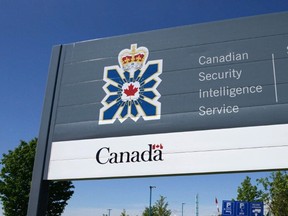The People’s Republic of China (PRC) and Russia are at the forefront of the threat, said veteran CSIS intelligence analyst Noura Hayek on Monday

OTTAWA — Canada’s spy agency has noted an “alarming escalation” of espionage and foreign interference since the beginning of the pandemic, with countries like China threatening or intimidating people in Canada into namely supporting a specific electoral candidate.
“These activities are real, they’re persistent, they’re increasing, and it’s not hypothetical, we see it everyday in our work. And these activities will be targeting all level of governments, whether it’s federal, municipal, provincial,” veteran CSIS intelligence analyst Noura Hayek told attendees of the Council on Governmental Ethics Laws conference Monday.
Sign up to receive the daily top stories from the National Post, a division of Postmedia Network Inc.
Thanks for signing up!
A welcome email is on its way. If you don't see it, please check your junk folder.
The next issue of NP Posted will soon be in your inbox.
Hayek, who now heads one of the Canadian Security Intelligence Service’s (CSIS) public outreach units, described foreign interference as one of the “most serious” and “most complex” threats currently facing Canada. The People’s Republic of China (PRC) and Russia are at the forefront of the threat, she said.
Foreign “adversaries” are acting against Canadian politicians, political parties and electoral processes to influence public opinion and undermine the country’s democratic system, she told a panel on the impact of disinformation on elections.
-

CRA clawing back $3.2B from suspect COVID-19 aid payments, but that's just the start
-

Canada to summon Russian ambassador over 'hateful' anti-LGBTQ tweets
“Our adversaries are very strong and the beast is very large,” Hayek said. “Certain state actors, such as the PRC, they really try and manipulate our democratic system to further their own interests or to discredit our institutions.”
Hayek said CSIS “actively investigated a number of threats” related to the 2021 federal election.
“Foreign states and their proxies are threatening and intimidating people in Canada,” she added. “The point is to attempt to influence their behaviour and their opinions. Individuals may be threatened or they have fear of reprisals if they fail to comply, for example, to vote for a specific person or contribute funds to a foreign state’s preferred party or candidate.”
Coercion isn’t foreign states’ only tool, Hayek noted. CSIS has found foreign states use “flattery,” “promises of compensation” or appealing to an individual’s “sense of pride” to influence and leverage them.
Foreign states are also turning their attention towards “traditional and community-based media” as well as social media to spread disinformation to influence election campaigns.
Hayek did not provide any specific examples of foreign interference. But her comments are of particular note in light of recent Global News reports saying that CSIS briefed Prime Minister Justin Trudeau in January on a “vast campaign” of Chinese foreign interference that targeted at least 11 federal candidates during the 2019 general election.
The report stated that the campaign involved covert payments to pro-Chinese Communist Party candidates, placing foreign agents into MP offices and efforts to undermine candidates China viewed as a threat. It quoted sources as saying that the Chinese Consulate in Toronto distributed $250,000 through a network of proxies to the candidates and other operatives.
Trudeau has denied being briefed on candidates allegedly receiving funds directly from the PRC during the 2019 election and insists that the 2019 and 2021 federal elections were free and fair. The RCMP has confirmed it is looking into “foreign actor interference activities.”
Hayek said that sometimes, the goal of foreign interference isn’t always “grandiose” like changing the outcome of an election. Instead, the objective can be to “weaken the trust” Canadians have towards their democratic institutions or the legitimacy of elections, or “promote the polarization of our politics.”
Terrorism threatens our lives, but espionage and interference threaten our way of lif
Noura Hayek
“Terrorism threatens our lives, but espionage and interference threaten our way of life. And that is really true today more than ever.”
She said during the 2021 election, CSIS provided classified briefings to the Critical Election Incident Public Protocol Panel, composed of senior public servants tasked with determining if an election threat is significant enough to meet the threshold of a public statement.
The panel never determined a threat met that threshold and a public announcement was not made, “good news” according to Hayek.
The veteran CSIS analyst also said “lax” rules surround social media and privacy laws have also allowed another key threat, ideologically motivated violent extremism (IMVE), to proliferate recently.
“Unfortunately, there’s a rise in the domestic violent extremism threats. And that’s alarming,” she said.
Speaking on the panel alongside Hayek, B.C. Information and Privacy Commissioner Michael McEvoy called for stronger rules protecting Canadians’ privacy and data.
He was particularly critical of social media companies like Facebook (“I refuse to call them Meta”), namely in light of the Cambridge Analytica scandal that he helped bring to light in the United Kingdom.
“Much more work needs to be done in both Canada and the United States… to solidify laws to protect the ways companies collect and use information,” he said.
“These companies really make good money, and there has to be some disincentive put into that system,” he said.


